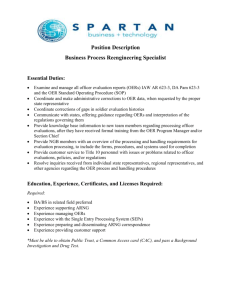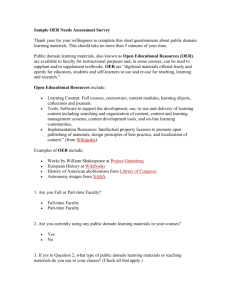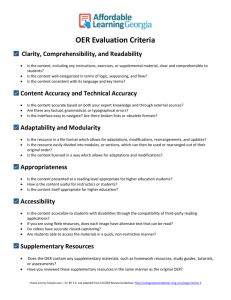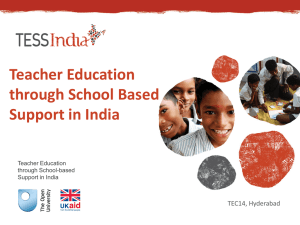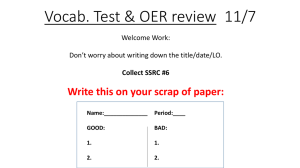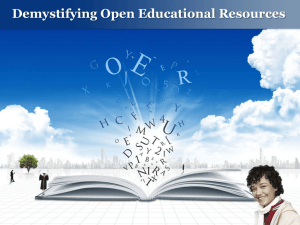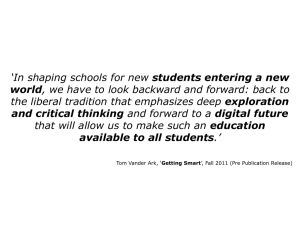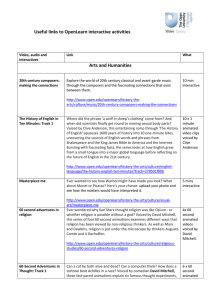Challenges and opportunities with Open
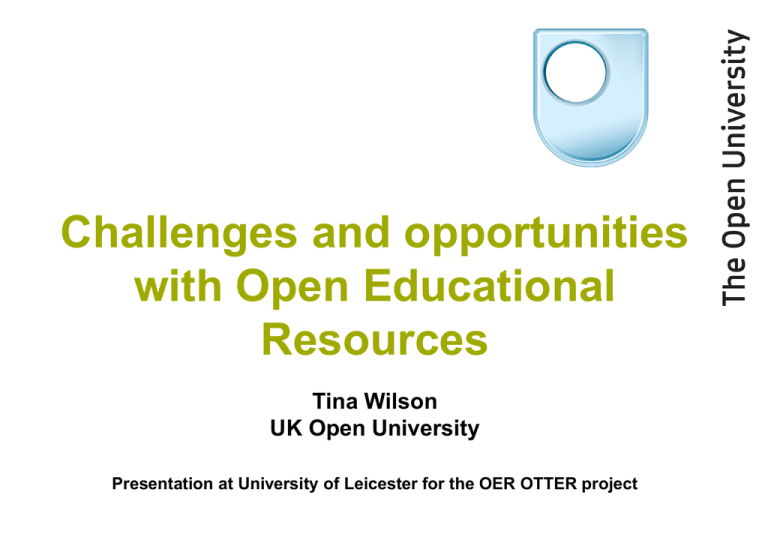
Challenges and opportunities with Open Educational Resources
Tina Wilson UK Open University Presentation at University of Leicester for the OER OTTER project
Introduction
• Background - changing context for Open Educational Resources • OpenLearn – transformation of content • Potential of OER to HEI worldwide - CAPITAL • POCKET project – building on OpenLearn • POCKET’s achievements at UK HEI • Ongoing work – OLnet • Introducing the SCORE project
Open Content: a growing field
Wikiversity MIT OCW Connexions TESSA Utah State
OpenLearn
• The UK Open University has been developing high quality distance learning materials for 40 years, • ‘The philosophy of Open Content is entirely commensurate with The Open University’s mission to equalise access to high quality educational opportunities … particularly among educationally marginalised groups’. (Open Content Initiative, 2006; Appendix L and H).
OpenLearn
• OpenLearn is funded by the William and Flora Hewlett foundation.
• The site was launched on 25 th Oct 2006 • OpenLearn – supports twin sites: - the LearningSpace – a supported open learning site for learners; and - the LabSpace – a supported community building site for creators
Wilson, T. (2007). Transformation for an open education repository: Issues associated with IT and Computing distance learning course materials. In proceedings of the International conference, Information Technologies: Theory, Practice, Innovations, pp 143-147, 6th and 7th Dec 2007, Alytus College, Alytus, Lithuania. ISBN 978-9955-9779-4-0 and ISBN 978-9955-9779-6-4.
Download
DOWNLOAD REMIXING AND SHARING
OpenLearn facilities
• • • • • • • • • Online forums, Unit reviews, Unit rating, Video conferencing, Synchronous messaging, Mind mapping tools, Print facility, A variety of download formats, New features: • RSS feeds • My OpenLearn
Academic Transformation
1.
Review material used in course 2.
Transform materials What are the steps in between?
Work flow (simplified)
• • • • • • • • • • Identify suitable material Agree material for release Find electronic copies of original materials Copyright check (ownership & 3rd party) Reasons not to go open Initial pedagogic review Transformation plan Conversion (to XML) Final review against plans Publish & release T. Connolly, G.M.d.S Ferreira, T. Wilson, (2007). ICODL Paper http://kn.open.ac.uk/public/getfile.cfm?documentfileid=13901
Copyright
Technology
Models for transformation
• • • The integrity model: very similar to original, as complete as possible, study as the original; The essence model: source material cut back, keep essential features, text into shorter blocks; The remix model: source material is starting point, redesigned for web delivery. Lane (2006) ‘From Pillar to Post: …’
http://kn.open.ac.uk/public/document.cfm?documentid=9724
Courses that convert well
Integrity Model • • • Are those with: a high proportion of textual content short video or audio clips graphical elements developed in-house
Preparing open content
• • • • • • Understand the technology Review the copyright Adjust the content to new context Understand how material will work Transform the content Expect some surprises
Creating Open Educational Resources (OER)
Units of Open Educational Resource (OER) • • • • Number of study hours Discipline area Self contained unit Labelled at a particular HE level (WW use) Lane (2006) ‘From Pillar to Post: …’ • • Audience Design of OER for reuse
Some key elements in design of OER
Essential key element options
Justification/rationale for OER Deliverable over the web Appropriate description of finished product Cohesive learning experience Development time for: Planning Evaluation Collaborative working practices
Desirable key element options
Assessment opportunities Third party resources Discussion prospects Feedback loop Software Open source Freeware, shareware, educational Wildcards Wilson, Connolly, Ferreira & Webb (2007) http://kn.open.ac.uk/document.cfm?docid=10477
OpenLearn current status
• Over six million unique visitors since 25 th Oct 2006, • • Visitors from 160 countries, More than 34,000 users registered to use additional facilities, • In excess of 13,500 learning hours currently available across the LearningSpace and LabSpace, • IMS platinum award winner & other nominations.
Potential of OER to HEI WW
Study involving six academics from 5 HEI across Europe and Africa - Technique: semi - structured interviews - Interviews took place between Jan 07 & Apr 07, Tina Wilson and Patrick McAndrew, (2009). Evaluating how five Higher Education Institutions worldwide plan to use and adapt Open Educational Resources. International Technology, Education and Development Conference. Valencia (Spain) 2009.
Potential of OER summary
• All participants were very keen to use the OERs – particularly the Study Skills, Mathematics and Statistics and Business and Management units • OERs would be used primarily for supplementary support • Integration, targeted support and professional development were also strong possibilities.
Tina Wilson and Patrick McAndrew, (2009). Evaluating how five Higher Education Institutions worldwide plan to use and adapt Open Educational Resources. International Technology, Education and Development Conference. Valencia (Spain) 2009.
Potential of OER summary
• The value of the OER units would be assessed in different ways. • Fairly equal numbers would either use the materials as presented or adapt them.
• • • However although academics were keen to adapt material and OpenLearn attracted many visitors, activity in the LabSpace was less than expected (a lack of downloading and repurposing of the available materials). Tina Wilson and Patrick McAndrew, (2009). Evaluating how five Higher Education Institutions worldwide plan to use and adapt Open Educational Resources. International Technology, Education and Development Conference. Valencia (Spain) 2009.
Introducing POCKET
• POCKET (Project on Open Content for Knowledge Exposition and Teaching) • Established to investigate barriers that inhibit users from uploading educational content to the LabSpace • POCKET, funded by JISC is a consortium of four universities - led by the University of Derby - partnered by The Open University, the University of Bolton and the University of Exeter
OU LOGO
Project Partners
POCKET objectives
• Capitalise on the investment in OpenLearn to build a wider pool of quality assured HE level Open Content • Reflect on the staff development process undertaken by the partners when converting the existing course content for use on the OpenLearn site • Determine the benefit of Open Content for HEI, both as providers of it and as users • Promote effective mechanisms for converting existing course materials into stand alone educational resources • Create a new module with all material developed for it as Open Content
POCKET learning from OpenLearn
• OpenLearn supported by a large team/ POCKET by a small team (worked in parallel since Sept 2007) • running very fast on OpenLearn to meet targets of 13,500 hours/ POCKET 250 – 600 hours • not enough time to document all activity.
• OU XML download package developed very quickly just before launch – the need for a development kit was identified • Previous user feedback dictated that other formats should be made available
Different approaches to
•
developing POCKET OERs
POCKET considered how to undertake the transformation process with: - a smaller POCKET team, - a different culture in which courses are produced (individuals or small groups rather than teams of academics), - a different type of course material (for campus-based students rather than distance learners).
• The learning technologist led approach (adopted by universities of Derby and Exeter) • The independent academic approach (adopted by University of Bolton)
Wilson and McAndrew
, (2009). Successfully…
Different approaches to
•
developing POCKET OERs
Learning technologist led approach - 10 stages of process guide & POCKET version of development kit : - Stages 1 to 4 LT and academic work together - Stage 5 LT converts material to OU XML - Stages 6 – 10 are review and change stages involving the LT and at some points the academic and POCKET team. • independent academic approach - Stages 2 - 9 carried out independently Tina Wilson and Patrick McAndrew, (2009). Successfully Exchanging Methods and Processes between institutions to Create Open Educational Resources. International Technology, Education and Development Conference. Valencia (Spain) 2009
Convergence of approaches
• In each approach it was difficult to use the OU XML package to upload new content • The need to download an OpenLearn unit, strip out the content, and replace it with content from POCKET material and add additional XML tags if unavailable was not an efficient or reusable process.
• A minimal course template was suggested by the academic at Bolton. • An ideal template was suggested by the LT and OpenLearn academic.
Tina Wilson and Patrick McAndrew, (2009). Successfully Exchanging Methods and Processes between institutions to Create Open Educational Resources. International Technology, Education and Development Conference. Valencia (Spain) 2009 .
Convergence of approaches
• The ‘minimal course template’ would include the essential XML tags of: - the course code and title, - the preface and introduction, - learning outcomes, - a main section and paragraph, - the back matter, for instance acknowledgements, • The ‘ideal template’ would additionally include: - activities, including various media (video and flash) and the answer tag - links to websites and also links to different sections of the same unit (cross references) - lists (like bulleted lists and numbered lists)] - sub-sections and sub-sub-sections Templates (empty of content) such as those suggested above did not exist within OpenLearn.
Wilson and McAndrew
, (2009). Successfully…
units
• • • • • • • • • At the end of January 38 POCKET units were published in the LabSpace 6 Law units 6 Business and management units 1 study skills unit 1 Mathematics and Statistics unit 2 Health and Lifestyle unit 1 Science and Nature unit 19 PlaySpace units An indication that POCKET could meet the target of between 250 and 600 study hours.
Wilson and McAndrew
, (2009). Successfully…
Ongoing work
• Existing OER communities having seven years experience in the development of OER • The Massachusetts Institute of Technology (MIT) http://web.mit.edu/ was the leader in this field with the OpenCourseWare (OCW) initiative in 2002.
• It is time to evaluate: - what has worked, - why it has worked and - how we can maximise on the design and redesign of OER for the benefit of learners and teachers.
Ongoing work
• The need to gather evidence of use and reuse of OER is identified as a major project: Open Learning network (OLnet), which started in March 2009. www.olnet.org
• OLnet is researching the adoption of Open Educational Resources worldwide and aims to build upon existing partnerships and social networks.
Ongoing work
OLnet provides opportunities to: • share and discuss ideas and designs for OER, • encourage worldwide use and reuse of OER for teaching and learning - using all available OER repositories • research and evaluate: - the impact of use and reuse of OER - facilitate transformative educational practices • OLnet is funded by the William and Flora Hewlett Foundation
Introducing the SCORE project
Support Centre for Open Resources in Education (SCORE) funded by HEFCE • Can help JISC/HEA funded projects though also has a role in helping all universities in England by providing • a support role for targeted OER publication • a teaching fellowship scheme • another focal point for aggregating and sharing information • an emphasis throughout on how use and reuse of OER influences teaching and learning policy and practice • Main contact is Rose Webb R.A.Webb@open.ac.uk
• Holding area for SCORE (until community focussed website using Cloudworks and other tools is available in near future) http://labspace.open.ac.uk/course/view.php?id=5129
